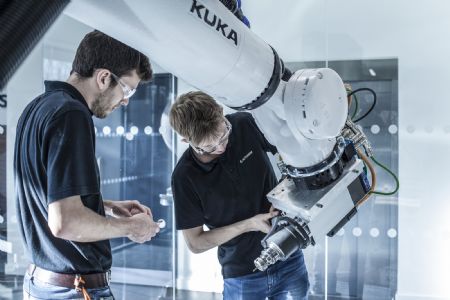
A robot cell installed by CNC Robotics at Autodesk’s Advanced Design and Manufacturing Facility in Birmingham has been used to manufacture part of the hull for a 3-D printed boat.
Launched at last year’s
Genoa International Boat Show, the MAMBO (motor additive manufacturing boat) features ‘a striking design’ that includes wave-inspired sides and a fin-like form that tapers toward the stern.
Milan-based Moi Composites collaborated on the design of the boat with Autodesk, which provided its Fusion 360 and Netfabb software. Sections of the hull were constructed in both Birmingham and Milan using continuous-fibre manufacturing with robots on both sites.
This 3-D printing process gives “greater durability and performance, while also saving material”. Moreover, the boat’s design is no longer restricted by the ‘traditional manufacturing process’, creating exciting new possibilities for designers.
This latest project continues a relationship that has developed since Liverpool-based
CNC Robotics was founded in 2010, and has helped the company to become established as the UK’s leading supplier of robots for machining applications.
Philippa Glover, the company’s managing director, said: “An important part of CNC Robotics’ evolution has been our strong relationships with our partners. I believe that the key to success for ‘UK Manufacturing’ is developing and maintaining these close relationships.”
CNC Robotics traces its origins back to 2008 when founder Jason Barker was searching for
a solution for machining large scale props to use in his Liverpool-based scenery-construction company.
When a cost-effective solution could not be found, Mr Barker set out on a two-year programme of research and development, and produced a robot machining system that could make large-scale props quickly and accurately.
Following this success, he realised there was huge potential to use robots as milling machines, not only in the entertainment industry but also in other applications that needed a cost-effective method for large-scale machining.
Simplified programmingAware that ease of programming would be needed for robots to fulfil their potential in machining, Mr Barker approached several CAM companies. He said: “I had an initial meeting with Delcam staff who were developing a dedicated program for machining with robots. Working with a team based in Birmingham made it easier to collaborate than it would have been with an overseas developer.
“In addition, the company had a good reputation for customer support, which I felt would be essential when introducing the new technology to customers that had little or no experience of using robots for manufacturing.”
Recognising the benefits of collaboration as part of its growth journey, CNC Robotics formed a close partnership with the Delcam staff at Birmingham, one that continued following the 2014 acquisition of the company by Autodesk.

Under the partnership, Mr Barker undertook testing of the software and provided feedback to the program’s developers. He also supplied the first robot to the Birmingham site to enable further software testing to be undertaken there.
As CNC Robotics expanded its business, the two companies worked together with a growing number of customers. The combination of the robotics knowledge of Mr Barker and his team, and the software and machining expertise of Autodesk in Birmingham ensured successful applications across many different industries and processes.
The partners also ‘aligned on marketing initiatives’ to promote the benefits of using robots for machining applications, including mounting joint demonstrations of the technology at trade shows
and exhibitions.
In the years following the acquisition, Autodesk invested millions of pounds in the Birmingham site, culminating in the opening of a new Advanced Design and Manufacturing Facility in February 2018.
This houses a range of advanced manufacturing tools, allowing Autodesk to “collaborate with its customers, helping them to solve some of their biggest challenges and to push the boundaries of manufacturing techniques”.
Twin robotsA robot-machining system based on two KUKA robots, supplied and integrated by CNC Robotics, was among the latest equipment added to the Birmingham site, and is now one of the first things that visitors see from the reception area. The capabilities of the system are used for software testing, and for a huge variety of projects, from advanced machining research to fun demonstrations — such as producing a giant chocolate rabbit as part of ‘Easter celebrations’.
CNC Robotics has also continued to partner with Autodesk on its marketing of robot technology. One highlight was an interactive challenge at the Autodesk University event in London in 2018. Noting that 2018 was both a World Cup year and the Year of the Engineer, the companies decided to bring football and robotics together for the first time with a robot goalkeeper challenge. Conference visitors were able to test their accuracy and speed with a football by scoring against
the robot.
The robot goalkeeper was also featured in a number of STEM (Science, Technology, Engineering, and Mathematics) events for school-children to raise their awareness of the career opportunities in manufacturing, engineering, technology and automation.
The team at CNC Robotics continues to support the development of the software, and work is now underway to include support for machining with robots in the advanced manufacturing capabilities of Autodesk’s Fusion 360 cloud-based tool for product development.
While CNC Robotics has often developed systems with other CAM programs, usually when customers want to continue working with their existing software, the relationship with the Autodesk solution
has always been the strongest. Mr Barker said: “Autodesk remains an important strategic partner as we look to continue our growth.
Most importantly, Autodesk and its resellers provide essential training and support to our customers to ensure that they enjoy increased productivity and profitability from the systems that we supply.”